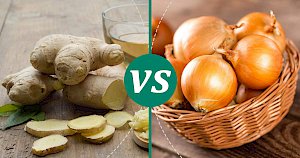Onion vs Ginger: Nutrition & Calories Compare


Onion vs Ginger
Nutrition Facts
Serving size:
change
5g10g15g20g30g40g50g60g80g100g120g140g160g180g200g220g250g300g350g400g450g500g600g700g800g900g1000g
1oz2oz3oz4oz5oz6oz7oz8oz10oz12oz15oz20oz25oz30oz35oz40oz50oz
Amount Per Serving:
Serving size:
change
5g10g15g20g30g40g50g60g80g100g120g140g160g180g200g220g250g300g350g400g450g500g600g700g800g900g1000g
1oz2oz3oz4oz5oz6oz7oz8oz10oz12oz15oz20oz25oz30oz35oz40oz50oz
Amount Per Serving:
Onion vs Ginger 100g Compare
| per 100g | Onion | Ginger |
|---|---|---|
| Calories | 40 | 80 |
| Carbohydrates | 9.34 g | 17.77 g |
| Fat | 0.1 g | 0.75 g |
| Dietary fiber | 1.7 g | 2 g |
| Protein | 1.1 g | 1.82 g |
| Calcium | 23 mg | 16 mg |
| Iron | 0.21 mg | 0.6 mg |
| Magnessium | 10 mg | 43 mg |
| Potassium | 146 mg | 415 mg |
| Sodium | 4 mg | 13 mg |
| Vitaminium B3 (Niacin) | 0.116 mg | 0.75 mg |
| Vitaminium B5 | 0.123 mg | 0.203 mg |
| Vitaminium B6 | 0.12 mg | 0.16 mg |
| Vitaminium B9 (Folic acid) | 0.019 mg | 11 mg |
| Vitaminium C | 7.4 mg | 5 mg |
| Vitaminium E | 0.02 mg | 0.26 mg |
The Fascinating World of Onion and Ginger
Onions and ginger are staples in kitchens around the globe, known not only for their distinctive flavors but also for their remarkable health benefits. These two ingredients have been used for centuries in various cuisines and medicinal practices. Before we dive into the specifics of their nutritional content, let's explore some interesting facts that make onion and ginger uniquely valuable in both culinary and health contexts.
Onions, with their sharp taste and aroma, are used to enhance the flavor of countless dishes. Beyond their culinary uses, onions are known for their health benefits, including their ability to improve heart health and reduce inflammation. Ginger, on the other hand, is celebrated for its potent medicinal properties, especially its effectiveness in treating nausea and aiding digestion.
Comparing Onion and Ginger: A Nutritional Perspective
When it comes to nutrition, both onion and ginger offer impressive profiles that can contribute to a healthy diet. Here's a closer look at how these two powerhouse ingredients compare.
- Calories: Onions contain about 40 calories per 100 grams, while ginger has about 80 calories. This makes onions a lower-calorie option for those watching their intake.
- Carbohydrates and Fiber: Ginger has a higher carbohydrate content at 17.77 grams compared to onions at 9.34 grams. Both provide a good amount of fiber, with ginger slightly leading at 2 grams.
- Fat and Protein: Ginger contains more fat (0.75 grams) and protein (1.82 grams) than onions, which have minimal fat (0.1 grams) and 1.1 grams of protein. Though both are low in fat, ginger offers a bit more in terms of protein.
- Vitamins and Minerals: Ginger shines with its higher content of magnesium, phosphorus, potassium, and vitamin B3, making it an excellent choice for supporting metabolism and muscle health. Onions, however, are not far behind with a decent supply of calcium, iron, and vitamins C and B6.
It's clear that both onion and ginger bring their own set of nutritional benefits to the table. Depending on your dietary needs and health goals, incorporating both can be a great way to enjoy a wide range of vitamins and minerals.
Adding Onion and Ginger to Your Diet
Incorporating onion and ginger into your diet is not only a smart way to boost your nutritional intake but also to add flavor and zest to your meals. Whether you're sautéing onions to add a depth of flavor to your dishes or grating fresh ginger into a stir-fry for a bit of zing, these ingredients are incredibly versatile.
Ultimately, the choice between onion and ginger—or rather, how much of each to include in your diet—comes down to personal preference and nutritional goals. Both offer unique health benefits and flavors that can enrich a variety of dishes. By understanding the nutritional content of these ingredients, you can make informed choices that contribute to a balanced and healthy diet.
Onion 100g
40kcalCalories source
- 88% CARBS.
- 10% PROTEIN
- 2% FAT
Ginger 100g
80kcalCalories source
- 84% CARBS
- 9% PROTEIN
- 8% FAT
Compares of onion
- Onion vs Asparagus
- Onion vs Beetroot
- Onion vs Bitter Melon
- Onion vs Bok Choy
- Onion vs Broccoli
- Onion vs Butternut Squash
- see all compares of onion
Compares of ginger
Read also:
- Calories from Onion
- Calories of Parsnips
- Calories in Peas
- Potato calories per 100g
- Pumpkin protein per 100g
- How many calories does purslane have?
- Calories in a half of radish
- Calories in whole radish
- Calories for one, two or more radishes
- Calories in handful of radishes
- Calories in bunch of radishes
- How much protein in rhubarb?
Marcin Piotrowicz
calories-info.com creator
Healthy diet and healthy lifestyle promoter
Add comment